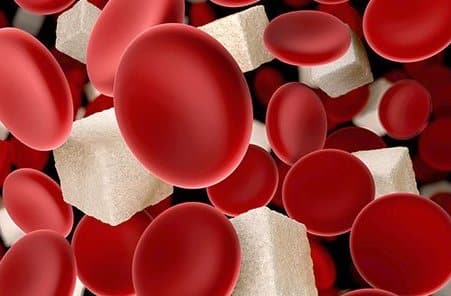Most of us know that if you can balance your blood sugar you’re going to be healthier.
But how does that work? And what's it got to do with your hormones?
Well a lot! If your blood sugar is out of balance the whole system is affected, and this can cause all sorts of symptoms including fatigue, mood swings, period issues, sex drive, weight gain & sleep!
And if you're peri-menopausal, this isn't going to help!
You can watch the video below or listen to the podcast.
How does it work?
Your blood sugar needs to be kept in a very narrow range, or it can be dangerous. So when you eat sugar, carbs or protein, your pancreas releases insulin to remove any excess sugar from your blood and take it to the cells of your liver, muscles and fat to use as energy.
The cells take what they need and the rest is converted to fat for future use (that's why insulin often referred to as the ‘fat storing hormone'!).

The blood sugar roller coaster
When you eat too many quick release carbs like sugar, bread, pasta, white rice, breakfast cereal, biscuit, fruit juice or a pastry, your blood sugar surges.
This stimulates a lot of insulin to remove it all. Trouble is it removes too much and causes a blood sugar dip a couple of hours later, resulting in a powerful craving for sugar or carbs, and here you go again!

It looks on a graph like a roller coaster, and once you’re on it its really hard to get off! And the bad news is that it not only makes you tired, grumpy, hungry and groggy – you’re constantly in fat storing mode.
Symptoms of Blood Sugar Imbalance
In my experience your energy, mood, weight and brain function follow your blood sugar balance! Here are some of the main symptoms to look for;
- Expanding waist:hip ratio – where your waist is bigger than your hips
- Hangry or dizzy – especially before eating
- PMS, heavy or painful periods
- Early hours insomnia – if you're waking at around 3am
- Sugar or carb cravings
- Mood swings
- Headaches
- Fatigue – energy slumps especially between meals (and mid afternoon needing a nap!)
- Frequent thirst or excessive urination (do get checked at your GP for this)
The Hormone Connection
As well as general health effects of blood sugar imbalance, your hormones can feel the brunt too;
- Excess insulin can raise Sex Hormone Binding Globulin (SHBG) which binds testosterone so that it’s not available for the body to use (goodbye sex drive!)
- Insulin resistance can raise an enzyme called aromatase, converting testosterone into oestrogen (cue oestrogen dominance!)
- Excess oestrogen can inhibit FSH and increase LH production, messing with your cycle and ovulation, lowering progesterone, increasing oestrogen & generally causing hormone havoc!
The Bigger Health Picture
If left untreated, blood sugar imbalance can lead to insulin resistance, Diabetes, heart disease, poor gut health, cognitive decline, cancer risks and accelerated ageing (yikes!).
How to Balance Your Blood Sugar
1/ DIET
- Start your day with a protein/fat based breakfast;
- eggs (any way), bacon or ham (free range/organic)
- porridge or soaked oats made with nut or soy milk (organic, unsweetened) – no sugar added, use berries, a scoop of protein powder, xylitol or stevia if needed
- smoked salmon, avocado
- protein smoothie (eg good quality protein powder, green veg, berries, seeds, nut or soy milk)
- granola (home made is best with nuts, seeds) with nut or soy milk (organic, unsweetened)
- Include healthy fats and protein at each meal
- Focus on slow carbs; eg all vegetables (white potatoes are the highest carb load), non gluten grains (quinoa, brown rice, buckwheat, millet)
- Try not to snack between meals, but if you need to, focus on low carb snacks like nuts, seeds, hummus, veggies, cheese, oatcakes, nut butters, low sugar fruit.
- Watch your alcohol and caffeine intake. Make sure you eat when you drink so the effects are limited.
- Try Time Restricted Eating or overnight fasting which has been shown to help with insulin sensitivity. Don't do this however if you feel dizzy, faint or super hungry!
2/ STRESS
When you’re stressed, cortisol is released to dump sugar into the blood for your fight or flight response. That causes an insulin response, and then another blood sugar dip a few hours later.
So even if you’re on the best diet in the world, if you’re stressed you’ll still be on that roller coaster.
Managing your stress is vital to balancing your blood sugar. Make sure you're scheduling in some daily relaxation and making your sleep a priority.
3/ EXERCISE
Exercise has a direct effect on how insulin works. It increases your cells response to insulin (something called sensitivity).
And that’s really important because it means insulin can get in to your cells and drop off it’s glucose to make for energy. If you’re not moving enough and insulin can’t do it’s job very well, then you’re at higher risk of obesity and diabetes.
A combination of HIIT and resistance training works well, and doing it in a fasted state is the best time to increase insulin sensitivity.
4/ SUPPLEMENTS
Certain supplements can help to balance your blood sugar, including;
- Magnesium supports the actions of insulin
- Vitamin D can help to improve insulin metabolism
- Chromium has been shown to enhance the effects of insulin
- Cinnamon can help increase insulin sensitivity
- Berberine can help to enhance glucose uptake into the cells
Do check with your Doctor or Health Practitioner before taking any new supplements if you are on any medication or have a health condition.
If you need any support with balancing your blood sugar, or getting your hormones tested, do contact us for more information.

